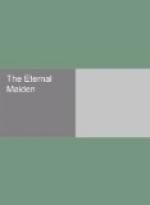In the customary preparations for the coming of Annadoah’s unborn child Ootah had entered with rare tenderness and solicitude. When a little one is expected among these northern people, new clothing, of the rarest skins of animals and the feathers of birds, must be made for both mother and child; a new igloo is built for the event by the happy father, for the little one they believe should come in a house unspotted and white as the driven snow. Annadoah was deserted, husbandless; the women of the tribe remained aloof from her; Ootah alone stood by her. And Ootah helped her with unselfish, eager gladness.
For several summers, in anticipation of the day when he might be a father, Ootah had gathered exquisite and delicate skins. These he now brought to Annadoah. There were silken young caribou hides, soft, fluffy white and blue fox pelts, as well as the skins of hares and the young of bears. Of these, Annadoah, in the last week of fading winter, made, according to custom, new garments for herself. Then, as the sun rose in early spring and the birds mated, Ootah went away to the high cliffs, where the auks nested, and jumping from crag to crag, hundreds of feet above the sea, gathered a thousand tiny baby auks, with crests of wondrous down, of which the hood for the unborn child was made. In these high crevices, from which at any moment he might be plunged to death, Ootah gathered mosses of ineffable softness, which were placed in the hood as a cushion for the little one.
Near her winter home, Ootah built a new igloo for Annadoah, and never was one made with more infinite patience and greater care. Inside it was immaculately white, and when he lighted the new lamp the walls glistened like silver; over the light he placed a new pot of soap stone, for everything in that place in which a new life was to come into being must by an unwritten law be freshly made and never used before. He built a bed of ice, laid it thick with moss, and over this tenderly placed, in turn, first walrus hides, then thick reindeer and warm fox skins. He brought to the igloo a supply of walrus meat, and then, fearful to be present at an event in which he had no right of participation, prepared to depart to the mountains to hunt game.
Before leaving he crept half fearfully into Annadoah’s old igloo and told her all was ready. She smiled fondly and reached forth her little hands. “Thou art very kind, Ootah,” she said, “thou art brave and kind.” Ootah was at a loss for words, but his heart beat high, and he was very glad.
The natives watched Annadoah, as, arrayed in her immaculate garments, she made her way, with bowed head, to her new home; they whispered among themselves as they saw the ilisitok (wise woman) follow later.
When she sank on the new and wonderful couch, gratitude filled Annadoah’s heart, and she murmured over and over again: “Thou art very kind, Ootah: thou art brave and kind.” Somehow the bright igloo became black and she seemed to be floating on clouds. She remembered the Eskimo women wailing in the moonlight . . . by the open sea . . . and the curse they invoked upon her through the dead. She trembled and felt inordinately cold. But she knew it was spring, for outside the igloo, with blithesome and silvery sweetness, a bunting was singing.




